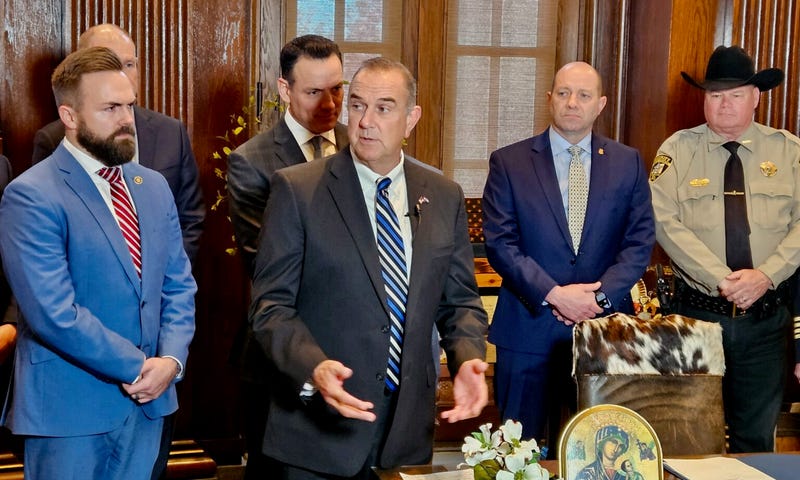
KANSAS CITY - The St. Louis Metropolitan Police Department will again be governed by a state board instead of local officials under a bill signed Wednesday by Missouri Gov. Mike Kehoe.
The change, reversing a statewide vote from 2012 that put the board under local control, is needed, supporters say, because of high crime rates in the state’s second largest city. Asked what would happen if crime does not decrease, Kehoe said no bill, on its own, will reduce crime.
“You can’t legislate lower crime, but what you can do is give law enforcement the tools it takes,” he said.
The bill restores the governing system that controlled the department from 1861 until the 2012 vote. With Kehoe’s signature, St. Louis joins Kansas City as the only major metropolitan police force in the country under control of a state board rather than local officials.
The Board of Police Commissioners will have six members — the mayor of St. Louis and five people appointed by the governor and subject to state Senate confirmation.
The bill directs Kehoe to name an interim director of the department within 30 days and the five commissioners within 90 days.
The bill passed on party-line votes in the House and Senate, with Democrats opposing the move with arguments that it was racist because Black Democrats hold the major offices in St. Louis and unneeded because crime is decreasing.
Critics point to statistics showing a drop in violent crime in St. Louis under local leadership. They say Kansas City has fared no better despite being under state control since the 1930s.
“State takeover is not based in reality, and only shows that Gov. Kehoe and the legislature are willing to throw out facts, reason, and the will of the people in order to give the safety of our city away to special interests,” St. Louis Mayor Tishaura Jones said in a news release.
Crime continues to fall in St. Louis, Jones said, and targeted violence prevention programs have reduced homicides by more than half in 2024 compared to 2023.
“From the very beginning, this bill has been a sham, and the governor’s signature represents nothing but disrespect for every Missouri voter who supported local control,” Jones said.
Senate Democrats filibustered the bill, winning additions of provisions banning the shackling of pregnant prisoners, establishing a fund for exonerated prisoners to receive restitution from the state and limiting what jails and prisons can charge inmates for phone calls.
Republicans also agreed to remove a provision that broadened the definition of rioting, a change Democrats feared would have wide ranging unintended consequences.
The bill also requires Missouri law enforcement agencies to report the immigration status of suspected criminal offenders to the state’s Department of Public Safety. It also expands the definition of a “dangerous felony” — crimes that require offenders to serve 85% of their sentence before parole —- to include the offense of first degree child endangerment and adds having fentanyl in the presence of a minor to the list of actions that endanger a child.
While legislative Republicans overwhelmingly supported reverting to state control of the St. Louis police, a recent poll suggests Missouri voters aren’t as enthusiastic for the move. And they would like it even less if state control was extended to their local law enforcement agency.
The St. Louis University/YouGov poll, which surveyed 900 likely voters in late February, found that 47% of voters supported local control of St. Louis police, 39% preferred state control and 14% stated they were not sure.
The results were similar when respondents were asked about Kansas City police, with 48% favoring local control. When asked whether state control should be extended to Springfield, the state’s third largest city, 55% said they preferred local control of police in that city.
And when asked about state control of their local police department, only 22% said that was their preference.
“In our February poll, 53% of Missouri voters rated crime in their community as fair or poor,” poll director Steven Rogers said in a news release. “But it seems that voters want their local cities to handle these crime problems — not the state.”
Other provisions in the bill were more popular. The poll showed 68% of voters support requiring law enforcement agencies to report criminal offenders’ citizenship status, while 87% said they support tougher felonies for possession of fentanyl in the presence of children.
The promises — and criticism — of the bill magnify its potential for success and failure.
State Rep. Brad Christ, a St. Louis County Republican, said the measure will reassure businesses and residents who have been leaving St. Louis that the city will get better.
“I truly believe it’s the beginning of the ascent of St Louis, and what it was and what it could become,” Christ said.
The bill is a power-grab that will not make the city safer, said Kristin Bowen, leader of the Missouri chapter of Moms Demand Action.
“Gov. Kehoe’s decision to strip St. Louis of its ability to control its own police force is a dangerous and shameless political stunt, driven by extremist Republican lawmakers hellbent on undermining communities they have no interest in protecting,” Bowen said. “This move is as cowardly as it is destructive.”
Missouri Independent is part of States Newsroom, a nonprofit news network supported by grants and a coalition of donors as a 501c(3) public charity. Missouri Independent maintains editorial independence. Contact Editor Jason Hancock for questions: info@missouriindependent.com.
